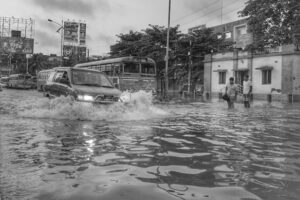Physical Address
23,24,25 & 26, 2nd Floor, Software Technology Park India, Opp: Garware Stadium,MIDC, Chikalthana, Aurangabad, Maharashtra – 431001 India
Physical Address
23,24,25 & 26, 2nd Floor, Software Technology Park India, Opp: Garware Stadium,MIDC, Chikalthana, Aurangabad, Maharashtra – 431001 India

India faces critical vulnerabilities to climate-induced floods and droughts, with new data revealing that 51 districts are at “Very High” flood risk and 91 districts at “Very High” drought risk. These findings are part of the report “District-Level Climate Risk Assessment for India: Mapping Flood and Drought Risks Using IPCC Framework” released by IIT Guwahati, IIT Mandi, and CSTEP Bengaluru.
The report provides a district-level analysis, pinpointing regions that demand urgent attention. It categorizes 11 districts—including Patna (Bihar), Alappuzha (Kerala), and Kendrapara (Odisha)—as facing “Very High” dual risks from both floods and droughts, necessitating immediate, targeted interventions.
Regional Breakdown of Key Findings
Flood Risk: Besides the 51 “Very High” risk districts, 118 districts face “High” flood risk. Vulnerable states include Assam, Bihar, Uttar Pradesh, West Bengal, Gujarat, Odisha, and Jammu and Kashmir.
Drought Risk: In addition to the 91 districts under “Very High” drought risk, 188 districts face “High” drought risk. The states most affected include Bihar, Assam, Jharkhand, Odisha, and Maharashtra.
Dual Risk Areas: The combination of severe flood and drought risks in 11 districts underlines the complex challenges requiring region-specific solutions.
Based on the Intergovernmental Panel on Climate Change (IPCC) framework, this comprehensive risk assessment integrates climatic hazards, exposure, and vulnerability. The findings align with India’s disaster risk reduction agenda, offering a roadmap for building resilience in the face of escalating climate challenges.
Expert Perspectives
Speaking at the launch event, Dr Anita Gupta, Head of Scientific Divisions at the Department of Science and Technology (DST), emphasized the collaborative nature of addressing climate change. ” Climate change is one of the most formidable challenges of our time, impacting agriculture, livelihoods, and every aspect of life,” she said. Dr Gupta highlighted the need to translate these findings into actionable strategies for both national and state-level stakeholders.
Pierre-Yves Pitteloud from the Swiss Agency for Development and Cooperation (SDC) highlighted the delicate balance between economic growth and climate resilience. “Achieving sustainable development requires a careful balance with climate resilience. For regions like the Himalayas, it is crucial to integrate climate adaptability with economic growth. With its rapid economic expansion and diverse climate challenges, India has a unique opportunity to set an example.,” he remarked.
Prof. Devendra Jalihal, Director of IIT Guwahati, shed light on the implications for India’s agriculture-dependent population. ” India’s agrarian society is deeply dependent on the monsoon, making the challenges posed by climate change, such as droughts and excessive rainfall, increasingly critical. This report, a collaboration between DST, SDC, provides a comprehensive risk assessment for over 600 districts, offering invaluable insights for effective mitigation strategies,” he stated.
Building Capacity and Adaptation Measures
The report also advocates for capacity-building initiatives at the state level. It highlights the need for equipping climate change cells and allied departments with tools to integrate these risk assessments into adaptation plans. Workshops and training sessions conducted as part of the study have already fostered collaboration among state departments, academic institutions, and local stakeholders.
Broader Implications and Future Roadmap
The report offers actionable insights for integrating climate risk assessments into State Action Plans on Climate Change (SAPCC). It highlights emerging risks such as heat stress and landslides and emphasizes incorporating future climate scenarios into planning processes. By advocating for multi-scale, sector-specific approaches, the report provides a robust framework for sustainable adaptation.
Banner Image: Dibakar Roy on Pexels
Comments are closed.
대전나이트클럽